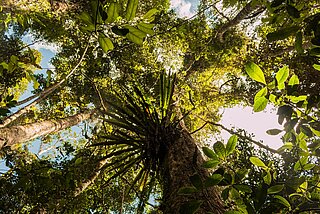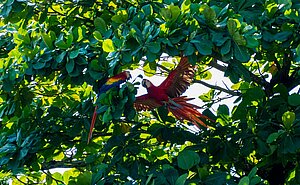International Day for the Conservation of Tropical Forests

IKI is involved in numerous projects to protect tropical forests and conserve their biodiversity.
Tropical forests are located between the Tropic of Cancer and the Tropic of Capricorn. They encompass a wide variety of forest ecosystems, ranging from tropical rainforests to tropical dry forests and mangrove forests on the tropical coasts.
Tropical forests constitute 45 per cent of the world’s forests. In addition to their many useful functions, they are also vital for climate change mitigation and the conservation of biological diversity. Tropical rainforests in particular are biodiversity hotspots, which are home to countless animal and plant species. At the same time, they bind large quantities of carbon and are thus an important natural carbon sink. Rainforests create the conditions necessary for these ecosystems and consequently preserve themselves. If these systems become imbalanced, their existential foundations will also be lost. Forests will become deserts and land that was formerly fertile will be degraded into soils that have no nutrients for plants. Mangrove forests provide a valuable habitat and nursery for many coastal and marine species, thus securing the livelihood of the local populations, which are often dependent on fishing. They are also key inclimate change mitigation, because they not only store significantly more carbon than terrestrial tropical forests, they can also protect coastal regions from the consequences of climate change, such as storms and floods.
Threats to tropical forests
The “International Day for the Conservation of Tropical Forests” is held every year on 14 September. It underscores the threat to tropical forests, the deforestation and degradation of which leads to an enormous loss of land: according to Global Forest Watch, tropical forest areas totalling 11.9 million hectares disappeared in 2019 alone. Around a third of this destruction took place in tropical primary rainforests, which are extremely valuable for global ecology.
The largest contiguous tropical rainforests are located in the Amazon lowlands, the Congo basin and Southeast Asia. The main cause of the loss of these forests is their conversion into agricultural land, but the extraction of mineral resources and the construction of infrastructure such as roads and settlements also play a major role and last but not least, illegal logging and other unsustainable forestry practices are also endangering tropical forests. A large part of the destruction of mangrove forests is due to shrimp aquacultures and logging for construction timber and firewood. However, the expansion of settlements, tourist infrastructure and agriculture can also lead to the loss of mangrove forests.
The COVID 19 pandemic has also exacerbated the situation. A current report of the WWF environmental foundation shows that the destruction of tropical forests indirectly caused by the pandemic has increased by an average of 150 per cent compared with previous years (report in german). Areas in Indonesia, Brazil and Congo were most affected. According to the WWF, this situation now exists because the pandemic severely restricts the work of the police, rangers and other state controllers and local populations burdened by high rates of unemployment are increasingly using the forests as sources of income.
How the IKI contributes to the protection of tropical forests
International Climate Initiative (IKI) pursues a variety of approaches to conserve or restore these ecologically valuable forest ecosystems.
One of these projects is located in the Caquetá region of Colombia. The region comprises 14 per cent of the country’s forest area, but it also has the highest rate of deforestation in Colombia, mainly caused by unsustainable agricultural and livestock practices. The project “Creating the basic conditions for reducing deforestation in the Colombian Amazon region (Caquetá) through sustainable agroforestry within the framework of integrated land use” therefore focuses on sustainable production systems and value chains. Rural families and indigenous communities are supported in the introduction of agroforestry systems that combine arable crops with trees and/or animal husbandry in holistic systems. These ‘agroforestry systems’ reduce deforestation pressure, while at the same time create alternative sources of income and improve the food security of the local population. The project also strengthens the ecological integrity of the areas by developing an integrated landscape model which creates ecological corridors linking indigenous territories, protected zones and sustainable farming systems. Thanks to the results of the project, the region can obtain funds for REDD+- measures and use them successfully.

Yet another IKI project is working to conserve the Leuser ecosystem in the north of the Indonesian island of Sumatra, a region with a vast biodiversity. Covering approximately 2.6 million hectares of tropical rainforest, it is the only place in the world where orangutans, rhinos, elephants and tigers exist together in the wild. Large amounts of greenhouse gas emissions can also be avoided in this ecosystem by preserving rainforests and peat bogs. The project “Biodiversity and climate protection in the Leuser Ecosystem in Sumatra” aims to protect the rainforest and its inhabitants. It therefore equips the local protected area administrations with the necessary infrastructure and advises them on the introduction of structures and the improvement of existing facilities. To improve the living conditions of the population and to avoid conflicts with the protected areas, the project develops plans together with the communities to ensure sustainable land use. The project has also created jobs in nature conservation, rebuilt an orangutan research station and promoted ecotourism. Besides agroforestry and community forests are supported, creating further income opportunities for the local population.
In Mexico, the IKI project “Restoring Mexican mangrove forests creates opportunities for social development” is working to conserve and restore the Alvarado lagoon system. Many coastal communities in Mexico are dependent on mangroves. Fishing and (often illegal) logging are the main economic activities. The project attempts to reconcile conservation interests with those of the population by supporting the legal, sustainable use and marketing of mangrove wood. Itprovides the communities with technical tools for the sustainable use of the mangrove forests, organises training courses and enables the sharing of experiences among the communities and the project staff. The project also encompasses the restoration of degraded zones. 59 hectares of mangroves have already been restored since the project was launched. 2,700 hectares of mangroves have also been declared an ecological reserve. The project is accompanied by hydrological and animal monitoring to incorporate the resulting data into future guidelines for the sustainable use of mangrove forests.
These and many other IKI projects help to protect the Earth’s green belt and the biodiversity it so ably hosts.
The link has been copied to the clipboard
Contact
IKI Office
Zukunft – Umwelt – Gesellschaft (ZUG) gGmbH
Stresemannstraße 69-71
10963 Berlin




